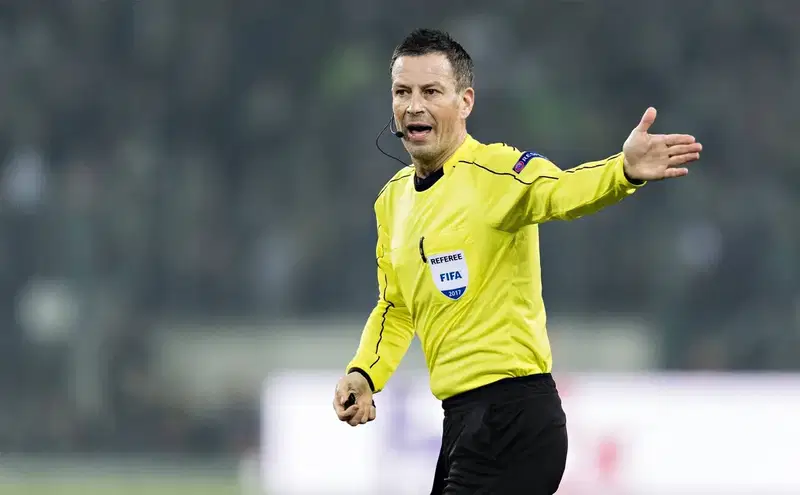Anfield was left fuming, tempers were rising, and the football world was once again split down the middle — but former Premier League referee Mark Clattenburg has stepped forward to defend Michael Oliver after one of the weekend’s most explosive flashpoints between Liverpool and Manchester United.
The moment in question came early in the first half when Liverpool midfielder Alexis Mac Allister went down holding his head after a heavy aerial challenge involving Virgil van Dijk and Bryan Mbeumo. While fans expected an immediate whistle, Oliver allowed play to continue. In the blink of an eye, United broke away, tore through Liverpool’s midfield, and found the back of the net. The decision not to halt play for a possible head injury sparked outrage across social media and in the stands.
But according to Clattenburg, one of England’s most respected former referees, Oliver’s decision was not as clear-cut as many fans think.
Clattenburg: “No Blame Should Be Attached to the Officials”
Speaking to TBR Football, Clattenburg broke down the controversial moment in detail, emphasizing that speed and circumstance made the decision incredibly complex.
“When Van Dijk, Mac Allister, and Mbeumo jumped for the ball, Michael Oliver had to determine whether a foul had occurred,” Clattenburg explained. “There’s an argument that Van Dijk caught his teammate, causing a head injury, and yes, according to the protocol for head injuries, play should stop at the earliest opportunity.”
However, he added that the fast transition made that impossible to assess in real time.
“This was a difficult situation for the referee,” Clattenburg continued. “In a split second, Manchester United broke forward and scored. Was there an opportunity to stop play? Oliver needed to be certain a head injury had occurred — and before he could make that assessment, United had already scored. Therefore, no blame can be attached to the match officials.”
In other words, the moment unfolded too quickly for any official to make a definitive call without risking an even greater mistake.
Liverpool Fans Left Furious — But Was Oliver Really Wrong?
While Clattenburg’s defense makes logical sense, it’s hard to ignore how much the call influenced the game’s tone and tempo. Many Liverpool supporters — and even neutral observers — felt that Oliver should have blown the whistle immediately, following standard head injury protocol. After all, a blow to the head is supposed to override all other factors, including attacking momentum.
The Professional Game Match Officials Limited (PGMOL) later stated that Oliver did not see the head injury in real time, but that explanation raised eyebrows among fans. The incident happened directly in front of several players, with Mac Allister clearly clutching his head as he fell to the ground. As Clattenburg noted, it’s more plausible that Oliver saw the collision but decided not to stop play as United surged forward in transition.
And that decision — one made in a split-second — dramatically changed the story of the game.
How One Call Changed Everything
The early goal forced Arne Slot’s Liverpool into an uphill battle almost immediately. They had entered the game as clear favorites, dominating possession in the opening minutes, but the shock of going behind shifted momentum. United suddenly had belief, while Liverpool were forced into desperate, rushed attacks that lacked the usual precision we’ve come to expect from Slot’s new-look Reds.
To Liverpool’s credit, they didn’t crumble. The Reds created multiple clear-cut chances through Darwin Núñez, Mohamed Salah, and Luis Díaz, but a combination of poor finishing and excellent United defending kept them out. It wasn’t until the 78th minute that Liverpool finally broke through and leveled the match.
The roar from the Kop said it all — relief, frustration, and renewed hope.
But that hope didn’t last long.
Just six minutes later, Manchester United struck again. Another defensive lapse from Liverpool — perhaps still mentally stuck on the earlier injustice — allowed United to reclaim the lead, sealing a victory that left fans furious but also painfully aware that missed chances, not just refereeing calls, had cost them dearly.
The Bigger Picture: Football’s Toughest Job
Clattenburg’s comments highlight something often forgotten in the chaos of football debate — referees must make split-second judgments in a game moving at lightning speed. One pause too early, and they’re accused of “ruining the flow.” One second too late, and they’re blamed for “changing the game.”
It’s a no-win situation.
While emotions understandably ran high after the final whistle, Clattenburg’s defense offers perspective. Oliver was dealing with a rapidly evolving counter-attack, a player down, and the weight of millions watching. Could he have stopped play earlier? Possibly. Should he have? Many fans think so. But was his decision malicious or negligent? Almost certainly not.
Liverpool’s Challenge Moving Forward
For Arne Slot and his men, the focus now must shift from controversy to consistency. Refereeing decisions will always spark debate, but Liverpool’s inability to capitalize on their possession and dominance remains the real concern. Despite creating enough chances to win twice over, they failed to take control when it mattered most.
Still, if there’s one positive to take, it’s that this Liverpool side continues to fight. They showed resilience, spirit, and flashes of brilliance — qualities that could yet define their season. But they’ll need sharper execution, fewer defensive lapses, and a little more composure if they want to stay in the title hunt.
As for Michael Oliver, he’ll move on, as referees always do. But this incident will no doubt remain a talking point — another reminder that in football, a single decision can change everything.
Final Verdict:
Mark Clattenburg’s defense might not soothe angry Liverpool fans, but it does shine a light on the impossible demands of modern refereeing. Whether you agree or not, one thing’s clear — the debate over that goal will rage on long after the final whistle.






















